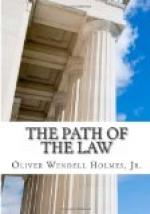Why is a false and injurious statement privileged, if it is made honestly in giving information about a servant? It is because it has been thought more important that information should be given freely, than that a man should be protected from what under other circumstances would be an actionable wrong. Why is a man at liberty to set up a business which he knows will ruin his neighborhood? It is because the public good is supposed to be best subserved by free competition. Obviously such judgments of relative importance may vary in different times and places. Why does a judge instruct a jury that an employer is not liable to an employee for an injury received in the course of his employment unless he is negligent, and why do the jury generally find for the plaintiff if the case is allowed to go to them? It is because the traditional policy of our law is to confine liability to cases where a prudent man might have foreseen the injury, or at least the danger, while the inclination of a very large part of the community is to make certain classes of persons insure the safety of those with whom they deal. Since the last words were written, I have seen the requirement of such insurance put forth as part of the programme of one of the best known labor organizations. There is a concealed, half conscious battle on the question of legislative policy, and if any one thinks that it can be settled deductively, or once for all, I only can say that I think he is theoretically wrong, and that I am certain that his conclusion will not be accepted in practice semper ubique et ab omnibus.




